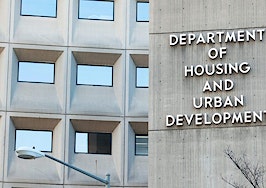A trio of civil rights groups announced plans today to sue the U.S. Department of Housing and Urban Development (HUD) over the agency’s plans to suspend an Obama-era fair housing rule until Oct. 31, 2020.
Under President Trump-appointed HUD Secretary Ben Carson, the agency announced in January of this year that it would put a hold on the Affirmatively Furthering Fair Housing (AFFH) mandate, which was first issued by HUD in 2015, back when Julián Castro was HUD Secretary.
The AFFH rule requires state and local governments to take steps to address segregated housing patterns and complete an assessment of fair housing, as a condition of receiving federal funding in the form of HUD block grants, which can be used to build housing or other infrastructure projects.
It also seeks to provide these local communities with the data and tools necessary to address segregation in the planning of their communities. Now three non-profit advocacy groups are suing HUD to make sure it continues to uphold the rule, instead of delaying it.
“The Fair Housing Act is a commitment this country made to dismantle a legacy of government sponsored segregation and inequality,” said Christina Rosales, the communications director of Texas Housers, one of the groups involved in the lawsuit, in a conference call today with reporters. “[AFFH] makes steps towards fulfilling that promise tangible.”
These provisions always existed in the Fair Housing Act — the landmark anti-discrimination federal housing law that was passed in 1968 — but it wasn’t until the 2015 rule was issued that tangible regulations compliance guidelines were enacted to guide state and local recipients of federal funds, according to the plaintiffs.
Before the 2015 AFFH ruling, cities and states — especially in Texas where Rosales is based — essentially ignored the part of the Fair Housing Act that calls on local officials to promote open and inclusive communities, Rosales said.
“For almost 50 years, HUD looked the other way,” Rosales added. “And because of HUD’s decision to delay implementation of the rule, that’s what we’re getting back to. Cities and states will continue to breaking the law and HUD, which is supposed to be the defender and promoter of integrated communities will continue to condone that.”
In Hidalgo County, a border county in the Rio Grande valley, Texas Housers and Texas Appleseed — another group participating as a plaintiff in the lawsuit — worked with residents of an unincorporated community to leverage the provision to facilitate a public forum. At the forum, residents shared with public officials issues in the community like lack of access to public services and substandard housing.
In suspending the rule, HUD is referring these local agencies to a 1990s-era rule called “Analysis of Impediments to Fair Housing.” Jorge Soto is the director of public policy for the National Fair Housing Alliance (NFHA) — the third group acting as a plaintiff in the lawsuit. He said in the conference call that the process did not work.
“The plans were often out of date or incomplete,” Soto said. “Some of them never even mentioned race, national origin or families with kids, or people with disabilities or the barriers they face. Local jurisdictions agreed that the process didn’t work, and asked HUD for more clarity and direction about what they should do to fulfill their fair housing obligations. HUD itself said that the old system did not work.”
Sasha Samberg-Champion, a civil rights lawyer with Relman, Dane & Colfax PLLC, is one of the lawyers representing the plaintiffs in the case. He is arguing that HUD’s action is lawless.
“There are well-established rules for how agencies can and can’t go about changing their own policy,” Samberg-Champion said. “There is a law called the administrative procedure act which sets these rules out pretty clearly. HUD broke these rules in multiple ways, and it’s not really a close call.”
Samberg-Champion explained that an agency can’t just decide one day it’s not going to follow its own regulations. And in this case, AFFH was the product of a year-long process that followed extensive notice and comment procedure.
In HUD’s notice posted to the federal register about suspending the AFFH, the agency argued that program participants need “additional time and technical assistance to adjust.”
In analyzing local applications for HUD funds from 2017, it found that 35 percent were not initially accepted for failing to meet regulatory requirements, as well as frequent misunderstanding of how to set clear goals, metrics and milestones that addressed fair housing issues.
After President Donald Trump was elected, HUD began a comprehensive review of its rules and regulations, soliciting public comment in the process.
“In response to the comments we’ve received, we are extending the deadline to submit these required assessments while HUD invests substantial human and technical resources toward improving [AFFH],” the agency said in a statement emailed to Inman. “HUD stands by the Fair Housing Act’s requirement to affirmatively furthering fair housing, but we must make certain that the tools we provide to our grantees work in the real world.”
Regardless of how this particular lawsuit plays out, one thing is clear: housing discrimination remains a problem across the U.S., and homeownership still lags in minority communities that were, and continue to be, discriminated against.












